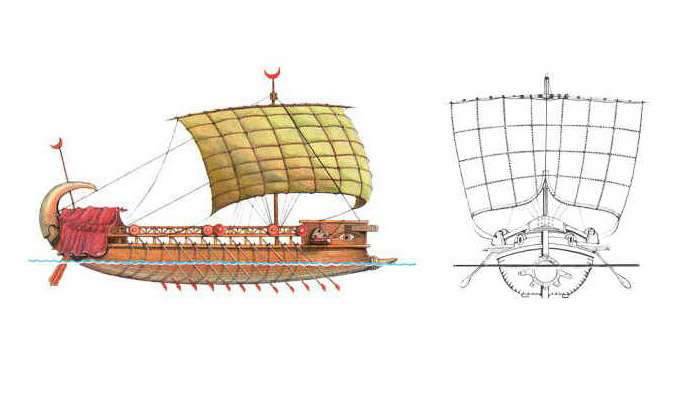August 2013
NascoBLOG 5

Phoenician Ship Image (c) www.oocities.org
Hello and as always, a warm welcome to NascoBLOG5
As promised; here is the follow up to NascoBlog4 supporting my statement : 'a Phoenician presence in South America is now indesputable'.
We saw in NascoBLOG4 positive evidence of Phoenician activity in South America because of the abundance of inscriptive material; this week we offer more proof using artifactual evidence, for example
a) The 'Phoenician Kingdom' covered a massive 42,000 sq,kms (26,000 sq.miles).
b) Contains six major archaeological sites: Memorial Plaza, a Scriptorium, a Planetarium and Linear Observatory, a Temple and an amazing 300 kilometres "Great Highway" lined with sculptures and geodetic 'signposts'.
c) A huge Chinese and a Greek effigy enscribed within the Nasca Lines - suggesting multi-racial team-work was involved in the creation of the Nasca Lines.
d) The huge number of human face intaglios depicting differing races of Peoples together with 'Greek' Gorgon effigies.
e) The intermix of human face imagery confirms a multi-racial Cult living together in harmony.
f) No shred of evidence of indigenous influence - from the Nascas, for example.
g) No physical evidence that the 'Kingdom' was ever conquered.
h) Complete absence of major domestic, social or religious forms of architecture - only a plethora of closely grouped, ruinous and unappealing 'hutments'.
i) Many circular and rectangular stone built structures, some marked internally with Phoenician characters.
j) Advanced knowledge of astronomy and navigational expertise reflected across the whole spectrum of the various constructions.
Having presented inscriptive material together with artifactual evidence we can say without contradiction that not only Phoenicians, but other Caucasians, Peoples from the Near, Middle and Far East, India and China had been living in and trading with South America more than 3000 years BEFORE Christopher Columbus, allegedly, made his 'discovery' of America in AD 1492.
In NascoBLOG6, we will conclude the series by considering why Herodotus, Plato and Homer may have deliberately misconstrued and glorified the facts surrounding the 'missing' Island of Atlantis'.
Please CLICK the ORDER BUTTON below to immediately obtain your copy of "Portraits of the Gods" incorporating the 'Lost Lands of the Phoenician-Canaanites… in Peru.
See you all again on the Wednesday, 11th September 2013.
William James Veall
NascoBLOG 4

Artist: Raphael 1483-1520 Title: The School of Athens
This work is in the Public Domain.
Hello and Welcome to NascoBLOG4,
I hope you enjoyed swotting up on Plato and Homer's 'mythological' stories and formed an opinion about the long lost Island of 'Atlantis'.
I appreciate the summer holidays are in full swing, so many of you may not have been able to tear yourselves away from sun drenched beaches and golden sands so, here is a very brief resume of 'Atlantis' history to help you catch up.
A Brief History of 'Atlantis'
The earliest known mention of 'Atlantis' appeared around 380 B.C from two of Plato's dialogues: TIMAEUS and CRITIAS acquired from a much earlier dialogue passed on to Solon (638 B.C.) by Egyptian Priests.
Subsequently, there have been many locations and versions of 'Atlantis. Some exotically fanciful, others with tales extolling the wondrous virtues of a secret Island paradise having a very advanced, politically stable, Utopian society. As that most respected ancient Greek Philosopher, Herodotus, (484 B.C.) reportedly said, "Atlantis was a superior civilisation lost in time".
Plato, (385 B.C.) a Follower of Herodotus, said 'Atlantis' existed 9000 years before his time. However, as most historians and geographers would quickly compute; a 9500 B.C. happening on the scale of 'Atlantis' is historically impossible so this may have been a figure plucked from Plato's deliberately fertile imagination.
However, in fairness to Plato, if he was using an alternative calendar system, say 'months' instead of 'years', his 9000 years would reduce to a reasonably acceptable date circa 1150 B.C. ( 400 B.C. + 750 'months' = 1150 B.C.) which from the point of view of inscriptive material (1150 B.C.) definitely signals a very early entry date of Phoenician Sea Peoples into Peru. ( Veall. "Portraits of the Gods")
Historically, the Phoenicians, became so power hungry they attempted to take over the rest of the known commercial World, only to be conquered at home by the rather more peace loving Greeks (332 B.C.) and who, by the way, were eventually defeated by the all conquering Romans Imperialists at Carthage (146 B.C.).
Very few Scientists, and Oceanographers in particular, have found any physical evidence that Atlantis ever existed and even if there was an island "that exploded with such violent eruption that it tore itself to pieces and sank overnight without trace" - it was NOT Atlantis.
Remember, mythology states that Atlantis was LARGER than Africa and Asia put together ". Now THAT would have been a disaster of such cataclysmic proportions it would have moved the very Pillars of Planet Earth.
If we refer to the 'Phoenicians and their multi-racial counterparts', by the collective name of Atlanteans, the whole story behind my sensational discovery begins to make sense:
Evidence from the Inscriptions and Legends
a) A revised date of 1150 B.C. coincides almost exactly with the invention of the Phoenician's international trading alphabet, circa 1200 B.C.
b) Phoenician style inscriptions are found throughout South America, especially along river trading routes and mining regions.
c) Phoenician inscriptions and legends are recorded in abundance from all the sites portrayed in "Portraits of the Gods", including:
d) the massive 3rd/4th Century B.C. Phoenician inscription on the Nasca Lines.
e) Phoenician inscriptions accompany virtually every intaglio and rock carving described in "Portraits": Human Heads,Gorgon images, Flaura and Fauna.
f) Copius geodetic signatures along the "Great Highway are Phoenician genre.
The arguement for a Phoenician presence in South America is indesputable
In time for NascoBLOG5 please try to obtain a copy of " Portraits of the Gods" because we will continue the evidence which led to the uncovering of one of the World's last great mysteries, the true location of an Island called ATLANTIS.
As August is holiday month for many of you, I am extending the NascoBlog3 question period until the 28th August.
So for now, have a great vacation, speak to you all on the 28th August.
To immediately obtain your copy of "Portraits of the Gods", please 'Click' the ORDER BUTTON.
Thank you.
William James Veall